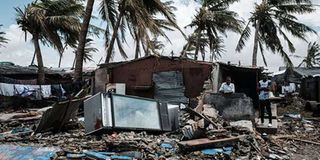TV show that moved a nation to tears, brought out best of mankind

The aftermath of Cyclone Idai near the beach in Beira, Mozambique. PHOTO | YASUYOSHI CHIBA | AFP
What you need to know:
- Darren could not go upstairs in their house in Hull and shared a ground-floor bedroom with Oliver.
- Mike gave up his career in the Navy to come home and help out.
- Allowing eight months for any CCTV tapes to be lost or wiped, Ashraf then submitted a claim for £3,000 for multiple injuries.
How much bad luck can a family have? Darren Hudson, 47, a roofer, fell victim to a spinal condition in 2017 and became partly paralysed and confined to a wheelchair.
Later that year, his wife, Sarah, died suddenly and Darren was left to manage with his sons, Mike, 25, and Harvey, 15, and his adopted son, Oliver, aged 18, who was severely disabled and liable to have up to 70 seizures a day.
NAVY CAREER
Darren could not go upstairs in their house in Hull and shared a ground-floor bedroom with Oliver.
Cooking and washing were difficult because many appliances were out of Darren’s reach. Mike gave up his career in the Navy to come home and help out.
A nightmare existence, but rescue came in the form of a television programme, DIY (Do It Yourself) SOS. This series, launched back in 1999, brings together skilled tradesmen to transform, extend, build or rebuild the homes of people in dire need.
For the Hudson males, over ten days, a team of unpaid volunteers built a two-storey extension with new bedrooms; they installed a lift for Darren, and for Oliver, a hydrotherapy unit in the garden and a bed hoist; designers also created a new, accessible kitchen, with sinks and cookers that could be moved up and down for Darren’s convenience.
BUILDERS
The 60-minute programme showed builders, electricians, carpenters, plumbers and designers hard at work, the house slowly coming to fruition, while the family stayed in a nearby hotel.
Finally, in the big showdown, Darren and his boys were brought back to contemplate their magnificent new home, a sight which brought every one of them to tears.
They were not the only ones to weep. The programme was watched by three million people, many of whom bombarded DIY SOS with messages declaring themselves, humbled, inspired and moved to tears of joy and compassion.
In the words of the television reviewer for The Times, “Here was tragedy soothed by community and compassion.
It was reality TV as a force for good, and you cannot say that very often. Anyone who can manage to be cynical about that episode must not have a heart but a big swinging brick.”
* * *
It seemed like an easy way to make money. Farida Ashraf got two friends to move a crate of orange juice cartons from a safe corner in a supermarket into an aisle where she managed to trip over it.
Allowing eight months for any CCTV tapes to be lost or wiped, Ashraf then submitted a claim for £3,000 for multiple injuries.
Unfortunately for her, a suspicious member of staff had kept footage which showed one of the two accomplices photographing the fruit cartons on the floor shortly before Ashraf fell.
At Bradford Crown Court, Judge David Hatton sentenced Ashraf to 21 months in prison for fraud but suspended the sentence in view of her health problems and because she had to care for various members of her family.
The accomplices were never identified.
* * *
It’s when someone tells you of their personal experience as a victim that crime becomes more of a reality.
Pat, an elderly lady, got home from shopping and realised her wallet was missing. When the phone went, she thought, “That will be Marks and Spencer saying they found the wallet I dropped.”
It was M&S all right, but they said she hadn’t dropped anything, she had been pickpocketed. Another customer had found the wallet in the pocket of a coat she had taken off the rails to try on.
The store explained how it worked – the thief stole and emptied the wallet, then popped it into a hanging garment in case he or she might be stopped by security on the way out.
All that was in the wallet now were the owner’s telephone number and some valueless club membership cards.
The big questions: Had it contained cash? And where were her bank cards?
Relieved, Pat said, yes, there had been fifty pounds in the wallet and that was a lot to lose, but importantly, no bank cards.
She had learned recently that some sophisticated conmen could scan cards in ordinary wallets, so she had bought a metal case for them and there they were, safely at the bottom of her handbag.
There’s no moral to this story except maybe that you can’t be too careful.
* * *
From a letter to a British newspaper:
“On March 20, our televised news topics related to a catastrophic cyclone in Africa, the burials of fifty murder victims in New Zealand, youngsters crushed to death at a St Patrick’s Day event in Ireland, yet another knife-related murder in a London borough… plus Brexit chaos and turmoil in Brussels as well as Westminster.
“Then the newsreader announced, ‘Today has been declared International Happiness Day.’ Really!”





